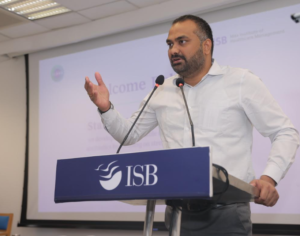November 22, 2024: The Max Institute of Healthcare Management (MIHM) at the Indian School of Business (ISB) and the International Centre for Antimicrobial Resistance Solutions (ICARS) recently hosted experts working in the antimicrobial resistance space to discuss better ways of sustainably using last resort antibiotics by strengthening antimicrobial stewardship practices.
The consultation organised at the Hyderabad campus of ISB brought together multiple stakeholders from the health sector across a range of functions, including clinicians, microbiologists, pharmacists, pharmacologists, hospital administrators within the government and private sector, civil society groups, biotech innovators, representatives from the pharma and diagnostic sector, as well as policymakers from Telangana. The consultation is integral to a project (TANDEM-ABX) that ICARS is implementing in India and Kenya as part of a planning grant with support from the Novo Nordisk Foundation (NNF), Denmark. TANDEM-ABX “Towards an Antibiotic Roadmap for the Sustainable Entry and Management of Antibiotic X” is being undertaken in India with ISB MIHM and CMC Vellore as country partners.
During the consultation, stakeholders collectively deliberated on ways in which responsible use (antimicrobial stewardship) enabling systems can be fostered by interlinking access and stewardship practices from the policy to the hospital level while introducing a reserve class of antibiotics.
Stakeholders highlighted that inappropriate antibiotic use is a key challenge in low- and middle-income countries (LMICs) like India and hampers access. Careful use of antibiotics or stewardship is essential for informing innovative pathways to introduce antibiotics from the ‘Reserve’ class. Unlike other antibiotics, these have a narrow spectrum of action, and their effectiveness can be rapidly compromised if not used in a highly targeted manner.

Shri R.V. Karnan, Commissioner, Health and Family Welfare, Government of Telangana, delivered the opening address. “AMR in the healthcare system is a concern for governments. We are focusing on spreading information and awareness in the state on this important issue. Telangana’s AMR action plan will strengthen our healthcare system’s approach to antimicrobial stewardship. ISB’s research initiative will provide valuable insights for evidence-based policymaking, particularly in understanding how we can better coordinate stewardship efforts across different healthcare settings. We are happy to extend our support in such research initiatives,” he said.
Speaking on the occasion, Professor Sarang Deo, Deputy Dean – Faculty and Research and Executive Director, ISB Max Institute of Healthcare Management, said: “While antimicrobial stewardship programmes are growing across hospitals, there is a dire need to generate strong evidence about the feasibility of coordinated stewardship efforts across multiple healthcare stakeholders. This consultation has generated several ideas on how to structure such a pilot and use it to generate high-quality evidence to shape policy on this matter.”
Dr Jyoti Joshi, Senior Science Advisor at ICARS, and project lead of the TANDEM ABX project, spoke about the stakeholder consultations saying, “This has been a valuable experience to listen directly from field-level stakeholders in India and we are excited because learnings from India can be useful for other LMICs to tackle AMR. Proactive planning to establish antimicrobial stewardship enabling systems will promote health preparedness and responsive policy that can help the right patient get the right antibiotic while preserving reserve antibiotics as a precious global good.”
Echoing similar concerns while highlighting the local context and solutions, Dr Ranga Reddy Burri, President, Infection Control Academy of India, said, “The antimicrobial resistance challenge presents a delicate balance between access and excess. While India’s robust pharmaceutical industry ensures affordable antibiotics, this accessibility, especially in regions like Telangana, it throws the challenge of misuse, which risks losing our most valuable antibiotics.”


+ There are no comments
Add yours